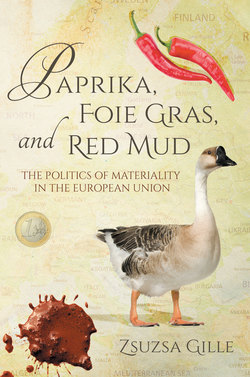Читать книгу Paprika, Foie Gras, and Red Mud - Zsuzsa Gille - Страница 6
На сайте Литреса книга снята с продажи.
ACKNOWLEDGMENTS
ОглавлениеI THOUGHT THIS BOOK would be easy to write. I certainly had written about the three case studies and I certainly had an argument, and yet the intricacies of connecting empirical findings to theory demanded that I let this book ferment, as one would a barrel of good wine. Over the years I was sustained in many ways—intellectually, financially, and emotionally—by many people and organizations. Without them the book would not have matured as I now see it has. For intellectual sustenance, inspiration, and constructive comments on the cases and the thesis, I owe the most gratitude to colleagues and mentors: Martha Lampland, Rachel Schurman, Nicky Gregson, Michael Burawoy, Michael Goldman, Saskia Sassen, Elizabeth Dunn, Katherine Verdery, Michael Kennedy, Yuson Jung, Melissa Caldwell, Gyula Kasza, Jacob Klein, Harry West, Neringa Klumbyte, Krisztina Fehérváry, Andrew Szasz, Michael Bell, Peter Jackson, Dace Dzenovska, and the Unit for Criticism collective at the University of Illinois at Urbana-Champaign—especially Lauren Goodlad, Michael Rothberg, and Jesse Ribot. Over the past few years, I benefited greatly from conversations and passionate debates with, as I affectionately refer to them, my “fellow fellows” of the Framing the Global endeavor at Indiana University, Bloomington, especially Rachel Harvey, Hilary Kahn, Michael Mascarenhas, Prakash Kumar, and Faranak Miraftab. I learned the most, however, from exchanges with my former student who has now, in a role reversal, become a mentor of sorts to me: Diana Mincyte. In addition, my arguments gained more precision from constructive criticism by anonymous reviewers at Eastern European Politics and Societies, Environment and Planning A, Global Society, and Indiana University Press.
I received generous support for conducting research over the years from the Mellon Foundation through its funding of the Framing the Global project; the Social Science Research Council; the UK’s Economic and Social Research Council; the Rachel Carson Center in Munich, Germany; International Research and Exchanges Board; Center for Advanced Studies at Ludwig-Maximilians-Universität in Munich, Germany; the Institute for Sociological Studies at Charles University in Prague, Czech Republic; and the following entities at the University of Illinois: the Social Dimensions of Environmental Policy working group at the Beckman Center, the Research Board’s Arnold O. Beckman Award, the Graduate College’s Focal Point Fellowship, the Center for Global Studies, the European Union Center, and the Faculty Exchange Program between the University of Illinois at Urbana-Champaign and the Katholieke Universiteit Leuven. My research not only benefited greatly from the conscientious assistance of many of my advisees—Jose Peralta, Taka Ono, Becky Gresh, Grant Shoffstall, and Jeremiah Bohr—but I also learned a lot from them.
I thank the many Hungarians who helped me understand the everyday complexities of food policies—farmers, salespersons, integrators, marketing experts, government officials, and activists. I owe the most gratitude to the many victims of the 2010 red mud disaster from Devecser, Kolontár, and Somlójenő. I especially thank Zsuzsa Halmay, Anita Soós, Mari Márton, and other members of the Vörös-Iszap Károsultakért Kiemelten Közhasznú Egyesület (Union for the Victims of Red Mud Disaster) for opening their homes and hearts at an especially difficult time in their lives. I am grateful to Dr. Ágota Lénárt for introducing me to officials and charity organizations active in the red mud aid programs and for teaching me about the psychological effects of disasters. I am grateful to the Sociological Institute at Charles University in Prague for providing me with space and time to complete the manuscript; the loneliness of the writing was much mitigated by the friendship of colleagues there and by the beauty of the Czech Republic.
My family in Hungary—especially my two aunts and two cousins—have made the hardships of fieldwork bearable by providing me with warmth, understanding, logistical help, humor, lots of home-cooked meals, and sometimes just with plain listening. My husband, Richard S. Esbenshade, not only accompanied me, initially with our children Shara and Ábel, to many of the research sites, but he also helped sustain our home and hearth in two continents, supported me not only emotionally and intellectually, but also by being a ruthless though patient editor of my writing. I thank the whole Esbenshade family for putting up with our crazy travel schedules and providing practical and emotional support.
My friends in Champaign-Urbana have kept up my spirits and self-confidence in more ways and more times than I can count: thank you, Behrooz, David W., Faranak, Anghy, Lisa R., Lisa C., Angelina, Manisha, and Dede. I also thank the Hochschilds for graciously opening their homes for a productive writing retreat in the summer of 2013, during which time Faranak offered companionship and motivation. To all of you and others I may have missed: thank you with all my heart.
